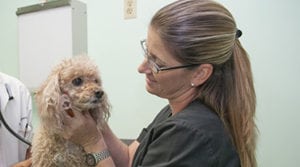Why Are Dog Vaccinations Necessary in Wilton Manors, FL?
As a dog owner in Wilton Manors, it’s important to follow a complete vaccination schedule to ensure that your best friend stays healthy and happy, and is not in danger of contracting viruses or diseases that may be harmful and possibly deadly. Learn more about dog vaccinations, and if you still have questions, call Arbor Pet Hospital at (954) 565-1896.
What are vaccines?
The function of a vaccine is to trigger an immune response to a certain virus which can help protect your pet from future infections and diseases. A vaccine triggers the body’s immune response to produce antibodies that can battle viruses. Keeping your dog up-to-date on vaccines will ensure that your pet will enjoy a healthier and happier life.
Vaccines help prepare the body’s immune system to fight the invasion of disease-causing organisms. Vaccines contain antigens, which look like the disease-causing organism to the immune system but don’t actually cause disease. When the vaccine is introduced to the body, the immune system is mildly stimulated. If a pet is ever exposed to the real disease, their immune system is now prepared to recognize and fight it off entirely or reduce the severity of the illness.
Are vaccines safe for my dog?
Vaccines are developed and manufactured under very strict FDA safety rules and must undergo robust vaccine trials. As mentioned above, vaccines contain a weak version of a virus or pathogen (something that causes a disease), and this pathogen triggers the body to produce antibodies that identify the pathogen and destroy it when it enters the body. For example, if your dog is vaccinated against Canine Distemper, and is later exposed to it, your pet’s body will recognize the virus and be able to fight it off. Since the protection that the vaccine provides gradually gets weaker over time, re-vaccination is recommended to boost the immune system to produce protective antibodies.
Depending on where you live in the US and the world, recommended vaccinations can vary due to climate, the presence or absence of particular viruses and diseases, and due to local, state and national requirements. Core vaccines are considered vital to all pets based on risk of exposure, severity of disease or transmissibility to humans. However, no matter where you live, vaccines are important for your dog for a variety of reasons.
- Vaccines are good prevention
Vaccinations protect your pet from many contagious diseases such as rabies (a zoonotic disease that affects the nervous system and can be transmitted to humans and other pets), Canine Distemper, Canine Parvovirus, Leoptospirosis, kennel cough (Bordetella), and Canine Influenza.
- Vaccines prevent pets from spreading disease to humans and other pets
Unvaccinated dogs pose a threat to the health of both their owners and to other pets. For example, a puppy or young dog who has not been vaccinated against Parvovirus (a very contagious virus that affects the GI tract, and causes vomiting, diarrhea and death if not treated) can easily infect other unvaccinated dogs and potentially cause death. Also, dogs and pets that are unvaccinated against zoonotic diseases such as Rabies and Leptospirosis can infect other pets, and humans. These diseases are very serious and can cause death if not treated.
- Vaccines keep your pet healthy
The weight of scientific evidence points to the fact that vaccinations are safe and effective at preventing many potentially deadly diseases. Experts agree that widespread use of vaccinations within the last century has prevented death and disease in millions of animals. There are lots of illnesses that used to be commonplace, but now thanks to vaccines, these disease are now rarely seen by veterinarians.
- Vaccines can prolong your pet’s life
Keeping your dog vaccines up to date ensures they will live a healthy and happier life, because they’ll be protected from a variety of diseases and pathogens that can cause damage to internal organs, the heart, and the nervous system. Some viruses and diseases can be deadly, and it’s especially important to follow vaccine recommendations for puppies and young dogs as they haven’t yet developed a natural immunity to these pathogens.
What if I don’t want to vaccinate my dog?
The WHO (World Health Organization) stated in a report that failure to vaccinate pets is one of the ten biggest threats to global health. Although world efforts in vaccinations have helped to greatly reduce the spread of viruses and diseases, the danger is that we could see a lot of these diseases make a comeback and harm us and our pets. Bacteria and viruses can remain in the environment for long periods of time, sometimes for years, and they can resurface when vaccination rates drop. When pet owners stop vaccinating their pets, many rare conditions such as Rabies become more prevalent. This is especially worrying for veterinarians, who aim to control the spread of disease in pet populations.
Because vaccines have been so successful in fighting contagious diseases, veterinarians warn that pet owners should not take that for granted. Just because cases of Rabies and Leptospirosis may be absent in a community, it doesn’t mean that these pathogens don’t exist in non-domesticated animals such as coyotes and raccoons. Pathogens still pose a risk to you and your pet, and it’s always best to follow vaccination recommendations. If you have any questions about vaccines, consult your veterinarian.
What about antibody titers?
Antibody titers are blood tests that measure the amount of antibodies in the blood, but while antibody titers don’t necessarily replace regular vaccines, they can help determine if your pet has an amount of immunity to a particular disease. However, the testing of antibody titers can be costly, up to ten times the cost of a vaccine. If you have any questions about getting your dog’s antibody titers tested, consult your veterinarian.
How often should pets be re-vaccinated?
Veterinarians have traditionally vaccinated each year, however, they are now learning that some vaccines induce immunity that lasts less than one year, whereas others may induce immunity that lasts well beyond one year. For example, after one year of age, your dog can receive a three-year rabies vaccine, as well as a two and three-year DAPPV (Distemper/Adenovirus/Parvo/Parainfluenza) vaccine. The AVMA recommends that veterinarians customize vaccination programs to the needs of their patients, since more than one vaccination program may be best for your dog.

